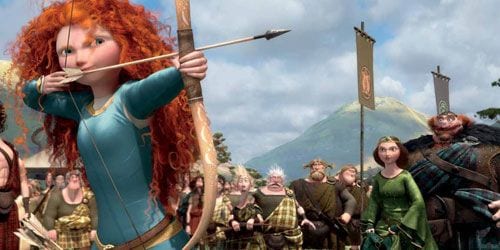
Editor’s note: This review contains plot spoilers.
“Marriage isn’t the end of the world!” So declares Queen Elinor (Emma Thompson), when her flamboyantly redheaded daughter Merida (Kelly Macdonald) insists she won’t marry a man she doesn’t know. The deal, struck by Merida’s dad King Fergus (Billy Connolly) and the leaders of the kingdom’s three other tribes, is that each generation re-confirms their unsteady peace by bringing two tribes together. That, and, the men of the tribes gather and drink and shout, while competing in manly activities like throwing hammers, shooting arrows, and racing horses.
Merida herself is actually very good at such activities, you know from the start of Brave, where she appears in the woods, galloping over her 10th-century Scottish landscape on her huge black steed Angus, splitting arrows with other arrows, and stealing extra cakes from the kitchen in order to bribe her three little brothers. So self-sufficient is Merida that she sees little benefit in aligning herself with a man, especially one of her three options, who arrive with their dads and promptly show off how inept they are: one’s too short, another too geeky, and the third too gangly. Merida, by contrast, is all enchanting poise and great courage and terrific intelligence, that is, when she’s not stomping her foot and whining to Elinor that she can’t possibly do what’s expected of her.
So far, the story of Brave sounds pretty regular — even if you remember that it’s Pixar’s very first feature with a girl protagonist. As Merida resists her mother, she’s more or less devoted to her dad (who, you’ve seen in flashback, lost his leg to a magical-monstrous bear while saving Merida’s life when she was a child). The familiarity extends to what happens following a particularly noisy fight between mother and daughter, when Merida goes so far as to run off into the woods, dark skies gathering.
In these woods, Merida stumbles upon what seems a solution, a witch (Julie Walters) in a cabin, complete with creeping shadows and a glowing cauldron. Here Merida seeks a spell that will change her fate, but the witch gives her one that changes her more immediate circumstances, as well as her mother’s.
SPOILERS AHEAD
This spell comes in the form of a magic cake that Merida takes back to the castle and feeds to her mother. Little does she know that the cake will first make Elinor terribly sick to her tummy and second, turn her into a bear. And here Brave turns into something unexpected, not a fairy tale that will secure the princess’ status and marry her off to a proper young prince, perpetuating the masculine order that fairy tales so love to perpetuate, but a story about a mother and her teenaged daughter.
This story is pretty brilliant. Not only does Merida now launch into a complicated mess of guilt and anxiety about the consequences of her tantrum, but she also faces a bear, bulky and hulking, unable to speak and crashing into bedroom furniture, a bear that is the perfect metaphor for the almost-always-already difficult relationship between a mother and daughter. Imagine it, you’re looking up at your mom, dark and gruff and angry and afraid. You have to find a way to communicate with her, and you also have to make sure that she survives in a castle headed by a man who nurses a famous grudge against bears.
Merida and Elinor go on to escape the castle and go into the woods, where they hope to find the witch (now missing) and come up with an antidote. This escape incorporates a series of mini-adventures, running from large men brandishing weapons in shadowy hallways, hiding from nervous servants, and enlisting the help of Merida’s little brothers. Out in the woods, Merida helps Elinor find freedom and also uncertainty, as they sort out how to catch fish and gambol in the sunshine, and, according to Elinor’s wont, eat their fish on plates, with forks. By the time they figure out they’ll need to sneak back into the bastion of male order, the castle, in order to break the spell, they’ve forged a connection that’s utterly unusual in fairy tales about mothers and daughters (in which the mother is typically evil, step-, dead or useless, as in The Hunger Games).
Their potentially good-times bonding takes place against a dire backdrop, of course: it’s possible that Elinor will not be changed back, and that the longer she stays a bear, the wilder, more instinctively violent, and scarier she gets. This means that bear and girl, mother and daughter, must come to terms with each other (and also come to an unspoken agreement about how to handle the men who so noisily crowd them).
If the montages-in-the-woods are predictable, the movie does offer a couple of small surprises, in particular when Elinor and Merida have to communicate with one another, in pantomime, across a room full of drunken men. The bear is pretending to be a stuffed bear — a trophy quite like the trophy a wife might be — while Merida is pretending to be the well-behaved daughter, compliant at last. As Fergus and his men friends smile and cheer, however, the girls are doing something else entirely.
All this is not to say that Brave is not a wholly ordinary commercial enterprise, selling all kinds of merchandise, including stuffed animals, Nintendo games, dolls, and playsets, not to mention the Deluxe Brave Weapon Set (plastic mace, sword, and ax), and oh yes, ideological conformity, to boys and girls alike. But for a minute, when Elinor is gesturing the great story of her daughter’s history and legacy and wonderfulness, literally over the heads of men, Brave represents an experience that so many mothers and daughters have shared, but rarely see in a movie.

![Call for Papers: All Things Reconsidered [MUSIC] May-August 2024](https://www.popmatters.com/wp-content/uploads/2024/04/all-things-reconsidered-call-music-may-2024-720x380.jpg)



